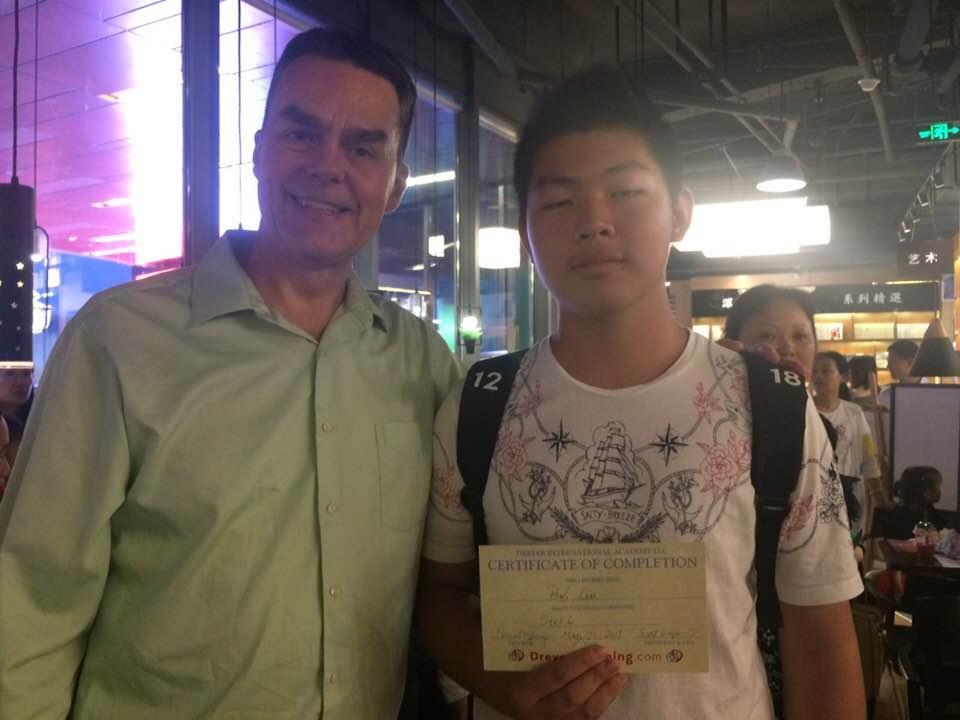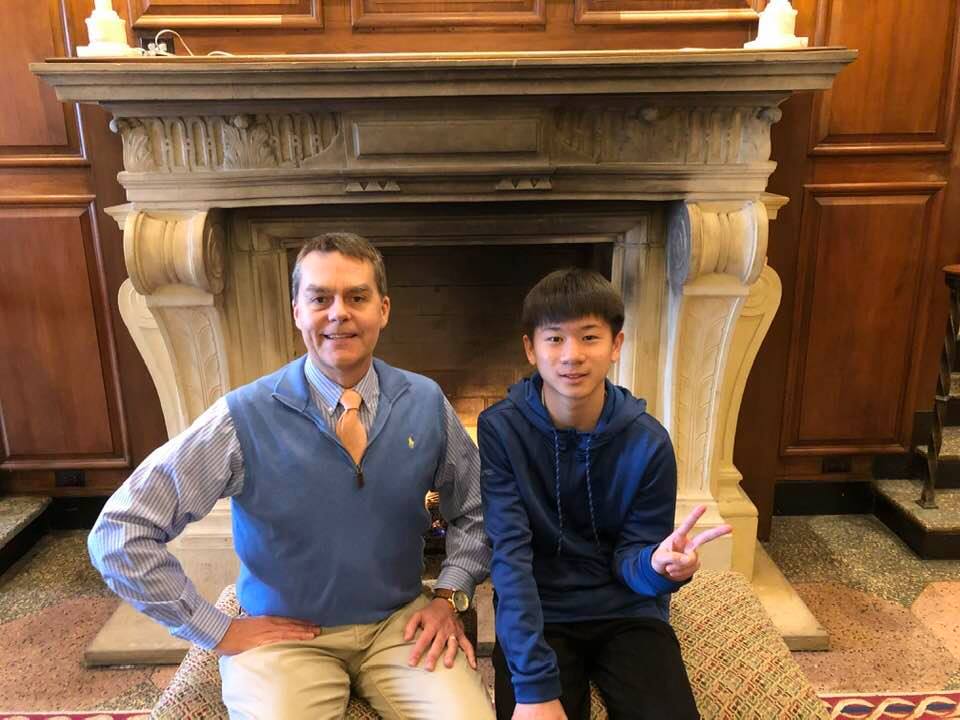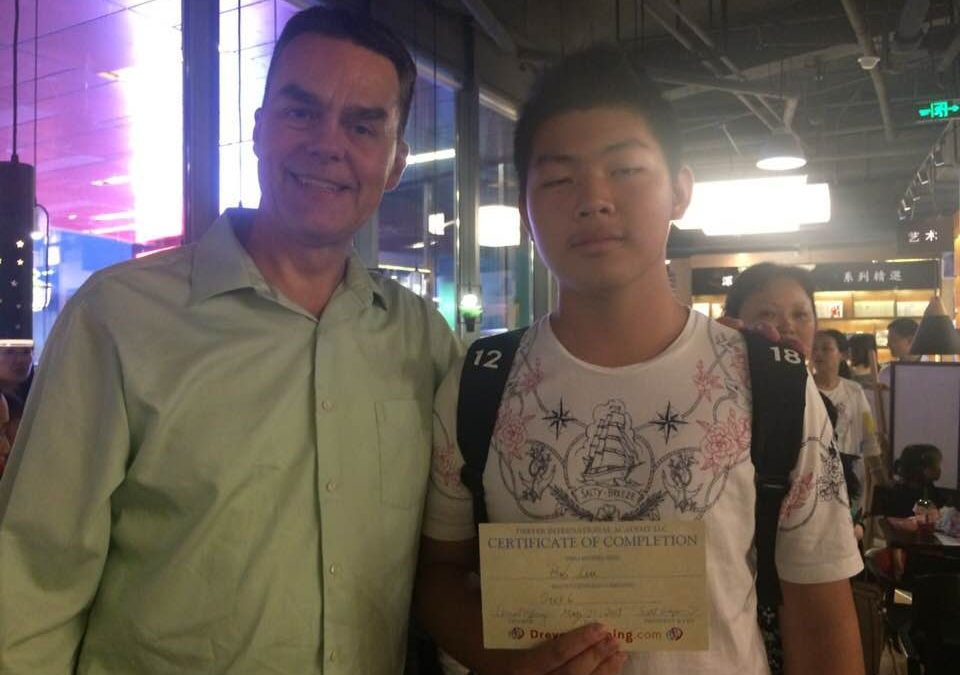
The biggest room in the world is the room for improvement.
-German Chancellor Helmut Schmidt
I have learned that success is to be measured not so much by the position that one has reached in life as by the obstacles which he has overcome while trying to succeed.
– Booker T. Washington, born in Virginia as a slave and later the first black person to be a guest in the White House.
Each 9 weeks, the DreyerCoaching.com teacher team nominates one student to win the “Most Improved” Award. Like the name says, this award is not for the student with the best English overall. It is for the student who shows the most improvement over the 9 week period.
每隔9周,DreyerCoaching.com老师团队会提名一名学生获得“进步最快”奖。顾名思义,该奖项并非针对总体英语水平最好的学生。这是针对在9周内表现出最大进步的学生。
To celebrate success and improvement, we created the DreyerCoaching.com Most Improved Award (最佳进步奖) for the first quarter of the 2018-2019 school year, to help also celebrate our 10th anniversary online.
2018-2019 1st 9 weeks
The FIRST winner of this new award, in November 2018, is Bob Liu, from beautiful Hangzhou, China.
Why did Bob win this award?
His DreyerCoaching.com teacher Mrs. McKinney reports that Bob has made GREAT progress since she began working with him, and Bob attends almost EVERY Friendly Free Friday class he can. Bob knows that learning a foreign language is a long-term process. On top of that, when my wife and I were in Nanjing in June 2018, Bob and his mother traveled two hours by train from their home to Nanjing, just to meet us in person. Wow! What commitment! Lastly, Bob is curious and likes to ask questions, and always has a GREAT attitude.
So, for all these reasons and more, Bob is our FIRST winner of the Most Improved Award. Congratulations, Bob!
2018-2019 2nd 9 weeks
The winner of the “Most Improved” Award for the second 9 weeks is Cici Liu, of Wuhan, China.
Over the past year or so, two things about Cici have made her stand out in my mind. First, she takes initiative to learn. At DreyerCoaching.com, we seldom ask our students to memorize passages, but several times her teacher, Mr. Woodson, told me that Cici had volunteered to memorize and then recite passages from her Reading 1 book about the US states like Vermont. He was so impressed, he would record her recitations and email them to me to watch. Second, once she learned the word “mayor” in English and when she realized the Chinese meaning, she told her teacher, “I want to be the mayor of Wuhan some day.” When I met with her for her bonus class the other day to celebrate her winning this award, I asked her why she wanted to be mayor of Wuhan. She told me in English, “So Wuhan can be number one.” (Wuhan, capital of Hubei Province, sits alongside the mighty Yangtze River and is home to more than 10.6 million people. That means, Cici’s CITY has more people than the entire US states of VIRGINIA and WEST VIRGINIA combined!
When I told our teacher team that we have a new “Most Improved” Award, Mr. Woodson told me he wanted Cici to get it for the next 9 weeks. Below is his glowing assessment.




This is Perry’s story, which you can also read on our Testimonials Page:
At first, I was scared of English. I didn’t want to study it. I didn’t want to face it, let alone study abroad. I was not interested in that language at that time, and even found it repulsive. But after spending more time with English, I have found it is no longer something I disliked. Instead, I have become interested in it. English has become a joy to me. Just three years ago, when I went into seventh grade, my English grades in school were not very satisfactory. I then had a chance to go to Canada for a month with my older sister. When we first arrived, I was afraid to talk to any of the foreigners. I admired my sister for not being afraid and being able to talk with those foreign people. She was able to interact, talk, and laugh with the people we met, just like a person would do while shopping in Taiwan and making small talk. After a few days in Canada, I started to try to talk with the foreigners and found that talking with them was not as terrible as I had thought. They respected my English skills. After all, English is not my mother tongue. After returning to Taiwan, I wanted to start improving my English ability. I was fortunate to meet Mr. Dreyer’s English teaching team, which greatly improved my English ability. The most remarkable thing is that when I began their classes, I was afraid to open my mouth to speak English, but now I can chat face-to-face with foreigners without fear. I have taken their conversation class, reading class, and a 1 on 1 class, and I recently got an A on my 9th grade final exams in school. I believe that my English is still not yet great, but for those people who are interested and want to improve their English skills, as long as they are assisted by Mr. Dreyer’s English team, they will definitely be able to achieve their dreams.
These are my thoughts, thank you!
Wishing you all the best,
Perry, Grade 9 student, Taoyuan, Taiwan
2019-2020 3rd 9 weeks
The most improved award this 9 weeks goes to Tammy Gao in Changde City, Hunan Province, China. Tammy attends a 1 on 1 class with DreyerCoaching Team-Teacher Mrs. Rosenbaum on Saturday nights. This is what Mrs. Rosenbaum said about why Tammy wins this award:
Tammy has shown much improvement this year. Her reading and pronunciation have steadily improved thanks to her work and she is doing very well. She shows substantial improvement in her speaking and understanding working with English and her outlook is always positive. She has put in much effort and it is noticeably paying off.

2019-2020 4th 9 weeks
The Most Improved Award for the last 9 weeks of the historic, challenging 2019-2020 school year goes to Peter Yuan in Beijing, China. Peter attends a 1 on 1 class on Friday nights with his teacher DreyerCoaching Team Teacher Mr. Woodson. Please note, Peter is only 7 years old!
This is what his mother says about Peter and another year with DreyerCoaching:
伍德森老师:
我很高兴您可以继续帮助彼得进行英语学习。今年,
谢谢您和德雷尔老师的帮助!

这是伍德森老师对他为什么选择彼得赢得该奖项的解释:
彼得总是准时上课,为每周的课做准备,
教导这样一个聪明而积极进取的学生是一件很高兴的事情。


Thanksgiving, a holiday about gratitude and rejoicing, has long been celebrated by most Americans on the fourth Thursday of November for more than a century and a half. However, Thanksgiving was in fact not celebrated on the same day throughout the whole nation before Lincoln delivered this proclamation. Lincoln, through using a plethora of rhetorical techniques, builds his authority on his argument that the celebration of Thanksgiving should occur on the same day on every inch of American soil to unite the fragmented nation.
Throughout the whole proclamation, Lincoln expressively alludes to God to bring all the audience, no matter from North or South, under the same cause: religion. In a culture heavily influenced by Christianity, most, if not all, believed in God, and this makes Lincoln’s biblical allusions exceptionally efficacious. Not only does the constant mention of God strengthen the connection between the audience and Lincoln, but it also further establishes a more positive bond between the opponents during such chaotic wartime. These enemies, for once, shared the same belief and work toward God’s way of life. The effects of Lincoln’s clever allusion to the “beneficent Father” do not stop there, however. After uniting the readers, Lincoln continues to describe the fatherly love God has for all people. Just as he stated, despite the war raging over the frontiers, the nation has continued to enlarge its land through conquest, to become wealthier through the abundance of precious metal, and to increase in prosperity, but “no human counsel hath devised nor hath any mortal hand worked out these great things. They are the gracious gifts of the Most High God, who, while dealing with us in anger for our sins, hath nevertheless remembered mercy.” This brings a sense of guilt onto the audience as they participate in the destruction of the nation, ignoring God’s unconditional love and efforts in bringing peace to the nation.
To further his argument advocating for the celebration of the Thanksgiving holiday on one day nationwide, Lincoln carefully utilizes specific diction to reinforce his point. First of all, he starts his speech by illustrating the ending days of the year with “fruitful fields” and “healthful sky.” By starting this way, he directs his audience toward a positive and cheerful mood. As people are more willing to comply with demands when in a delightful mood, Lincoln ingeniously asserts his argument through uplifting tone and diction. Moreover, this pleasant description of the ending days of the year creates a strong juxtaposition with a time of disorder, of war. As the nation stands amidst an atmosphere of fear and division, a moment of harmony or tranquility becomes increasingly desired by all. He then states that the nation’s prosperity should be “solemnly, reverently, and gratefully” acknowledge as a single, unified voice of all American people. The three words “solemnly,” “reverently,” and “ gratefully” create a strong sense of gratitude and respect, which are the essence of the Thanksgiving holiday.
Last of all, Lincoln directly calls for a change. He invites all American people in every state, in foreign lands, and at sea to adopt the fourth Thursday of November as the day of Thanksgiving, for it is “a day of Thanksgiving and Praise to our beneficent Father who dwelleth in the Heavens.” Going beyond just “inviting” every single American citizen to embrace that date as the official Thanksgiving, Lincoln not only expresses the country’s penitence for its “perverseness and disobedience” to God but also an appreciation for His “tender care” for all of those whom the war impacted: the widows, orphans, mourners, or sufferers. By relating these victims of society, Lincoln tugs at his audiences’ heartstrings and exhorts them to put effort into healing these people along with the nation. In his concluding sentence, he earnestly begs for divine interposition to restore the nation and heal the wounds the war had caused. Finally, he connects back to the idea of unity and harmony in which he states that the nation should soon be consistent with the “Divine purposes to the full enjoyment of peace, harmony, tranquillity, and Union.”
In a time when the United States is fractured and turbulent, Lincoln seeks a way to reunify all the Americans: standardizing the date of Thanksgiving. Through the use of biblical allusions, eloquent diction, and direct call to action, he effectively delivers his argument about the importance of sharing gratitude in the same moment and fostering harmony among all.
*****
Keep in mind, not only is Ian’s thinking and writing in this piecew at a highly developed level, this is a young man who has spent his entire life living in Chinese-language environments: Mainland China or Taiwan.
Granted, Ian has attended bilingual or English-language schools all along. Still, the fact that he has lived his whole life till now in East Asia yet can write English on such a high level I find remarkable.
You can read the blog containing Lincoln’s Proclamation and the “literary analysis” essays by Ian and two of his outstanding classmates here.

Sarah has been a faithful student in her DreyerCoaching classes for the past 2 academic years. She began with the grade 1 Spelling & Reading books, and is now in the challenging stories and articles of Reading book 2 and quite close to completing Spelling book 2. She is always punctual, participates well, and consistently sends back her reading practice on WeChat. Sarah also tells me about what she’s doing in school and talks about family activities and outings. In our class today, she taught me the Chinese word for “wasp or hornet”, which is different from the word for “honeybee”. I’m encouraged by how much Sarah has improved in her pronunciation and in her retention of the meanings of vocabulary words we’ve studied and practiced.
*****

